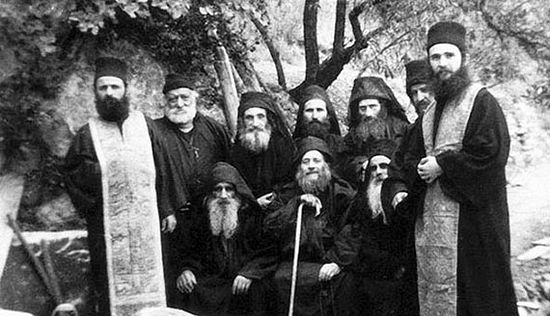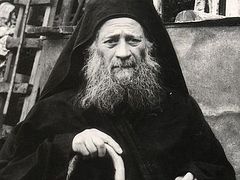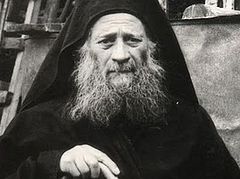As explained in Part 1 of these articles, the following stories were not included in the published editions of Elder Ephraim’s biography of St. Joseph in any language besides English.
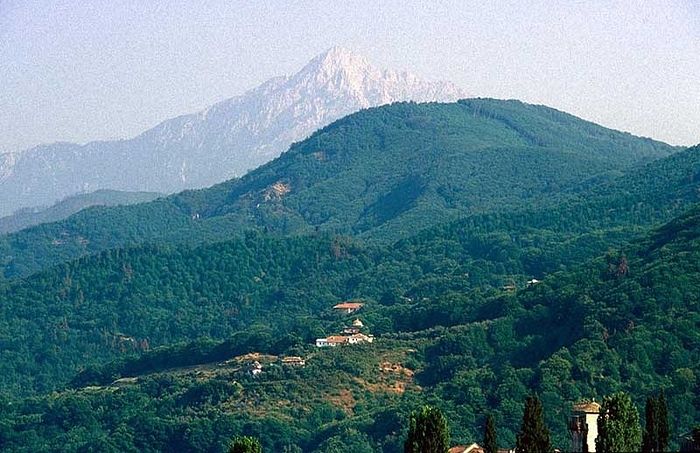 St. Basil’s Skete. Photo: mountathos-eshop.com
St. Basil’s Skete. Photo: mountathos-eshop.com
One night when Fr. Anatolios [i.e., Fr. Arsenios] was still in Jerusalem, he had a dream that a heavenly messenger brought him a letter supposedly from his mother, but it was really from the Panagia. The letter said: “My child, if you want to be saved, come to my garden at the Holy Mountain.”
* * *
Years would pass before Fr. Arsenios was overshadowed by grace. It took so long because he first had to wipe out the passions stemming from his bad habits. Then one night after eight years, Fr. Arsenios fell at Geronda’s feet with tears saying, “Oh, Geronda! What was that that you gave me tonight through your prayers? I was filled with light, inside and outside. Christ came and smiled at me.” Geronda also wept for joy hearing this and said, “Yes, that is it, Arsenios.”
* * *
Only once in his life did Elder Joseph not wake up for his vigil. One day Papa-Ananias said to him, “Geronda, is there anyone else in the entire Holy Mountain who mindfully and seriously practices hesychasm with praxis and theoria? I doubt it. You are the only one.”
He was momentarily enticed by this compliment, and his face looked as if he was in a daze. But a second later he regained his senses and exclaimed, “Get behind me, Satan!” and punched himself on the thigh with all his might. “Forgive me, my God!” As a “penance” for him, God allowed him to be so sleepy the following night that he slept right through his vigil until late in the morning. To make up for not doing his prayer rule that night, he did it during the day instead of working.
After experiencing how easy it is to accept vainglorious thoughts and seeing how much damage they do, he later wrote to someone: “Be careful … not to compliment one another in each other’s presence, for if compliments harm the perfect, how much more harmful they will be to you who are still weak.”
* * *
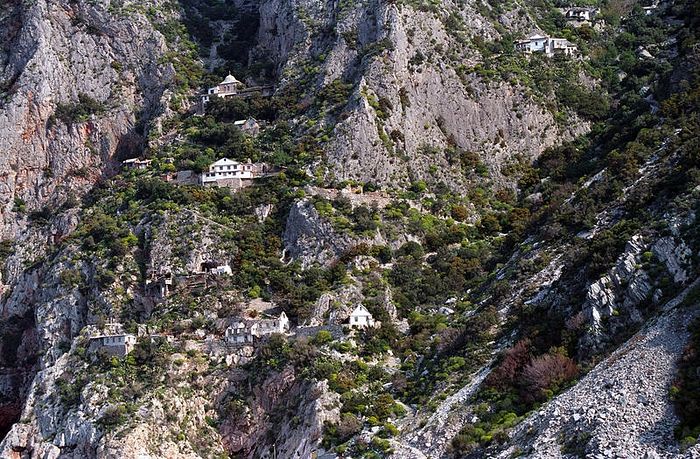 St. Basil’s Skete. Photo: mountathos-eshop.com
St. Basil’s Skete. Photo: mountathos-eshop.com
Elder Joseph and Fr. Arsenios dug two graves for themselves at St. Basil’s Skete, and they wanted to stay in them in order to concentrate on prayer. Elder Joseph told Fr. John: “Fr. Arsenios and I are going to stay in these graves and pray. We have enough rusks to eat, but we will need water to survive. Can you bring us some water every day?” Fr. John objected, “What do you think I am? A donkey?” “Is that all the gratitude you have for me?” Elder Joseph replied with disappointment.
* * *
Elder Joseph had mastered the skill of self-restraint. Even though he always had intense compunction during those services in the chapel, only twice in his life did it overwhelm him so powerfully that he could not chant the cherubic hymn.
* * *
Sometimes after having a grace-filled vigil, Elder Joseph would also sigh and then add jovially in an improvised song, “But what’s in store for me now!”
“What do you mean, Geronda?” Papa-Ephraim of Katounakia asked.
“There is a law in the spiritual life: If you suddenly experience a divine outpouring of grace when you are in a regular spiritual condition—that is, neither particularly high or low—this means that a temptation is coming with intensity proportional to the amount of grace you received. God does not give His loukoumia for free; you pay dearly for them. Since there was no battle beforehand, this divine caress was not to reward my efforts but to warn me of an upcoming temptation.”
“But Geronda, you have attained theosis. How can anything bad be in store for you?”
“You’ll see,” Geronda replied.
Two days later, Papa-Ephraim came back to serve liturgy, and Geronda appeared to be in such a good mood that he was even telling jokes—but deep down he was going through hell. When he wanted to, he could make you split your side laughing.
Seeing Geronda so happy, Papa-Ephraim said to him, “What’s in store for you? Joy and blessings!”
Then Geronda said to him, “Come here,” and he took him aside so that the others wouldn’t hear him. “Now I understand the pain that souls possessed with demons feel. I see the enemy of our souls over there watching to see if his poisoned darts are striking their target. I’m not going to give that horned monster the pleasure of seeing me troubled and in pain.”
* * *
Sometimes I [Elder Ephraim] misunderstood Geronda in humorous ways. To protect me from speaking with visiting laymen, he told me when I was a novice, “Whenever you see a layman, disappear; run away.” A little while later one day Geronda saw me drenched with sweat. “My child, what happened?” he asked with concern.
“Geronda,” I replied, still gasping for breath, “I saw a layman coming and ran away to avoid him! I nearly had a heart attack running up those steep paths!”
“Oh, not like that, my child! It’s only a layman; he’s not a demon!”
* * *
After arguing with Fr. Bartholomew about the calendar issue, Elder Joseph returned to his cell to rest, but he was still in a disturbed state. As soon as he entered his cell, he heard a scratching noise under the planks on which he slept. When he lifted up the planks to see what it was, he saw a demon with horns and a tail! Since Geronda had abundant grace in his soul, he was not terrified. But justifiably surprised, he asked the demon, “What do you think you’re doing here?”
“You’re the one who invited me in,” the demon replied, “by saying those things outside to Bartholomew.”
As soon as he heard this, he was shocked and disappointed. He said to himself, “By saying harsh things about the new-calendarists, I must have blasphemed against God’s Church and enabled the demon to enter. Could it be that they are closer to the truth than we are?” The demon disappeared after Geronda made the sign of the cross. Then he began to pray with many tears so that the truth would be revealed to him. After praying for a while, he fell asleep.
In his sleep, God showed him the dream in which he found himself on a small chunk of Mt. Athos in the sea, and the waves were threatening it.
* * *
When Fr. Athanasios told the fathers at the Lavra that Elder Joseph had decided to side with the monasteries, they didn’t believe him! They said, “How can such a zealous, strict person possibly leave the zealots?”
Fr. Athanasios replied, “What would you like me to do to prove to you that I am telling the truth?”
They said, “We want to see you receive communion here with us.” So he stayed overnight and received communion with them the following morning. Then they believed him.
Elder Joseph taught all his disciples these lessons of discernment: “When one of your five senses perceives an unusual phenomenon during prayer without your soul feeling anything, pay no attention to it; God is beyond the five senses. But if joy or hope come to your soul when you smell a fragrance, see a vision, hear something, or have any other sensation, neither accept it nor reject it, but go tell it to your spiritual father immediately. “If the triad of faith, hope, and love before you begin praying is—in a manner of speaking—ten degrees, and afterwards your faith, hope, and love have increased to one hundred degrees, then this transformation is from God. The evil one is incapable of inspiring you with faith or hope or love, since he lacks all three of these.
“If these three have increased after your prayer, know that your prayer has been accepted. If these three have remained the same, know that you have prayed in a worldly manner. If these three have decreased, you have prayed in a deluded manner. And if after your prayer you feel some kind of carnality, even if only slightly, you have prayed wrongly.”
* * *
When a radio was brought for the first time to the Holy Mountain, the old monks who had been away from the rest of world for decades were thunderstruck. When some of the simpler monks saw how enchanted everyone was by it, they exclaimed, “That box is demonic!”
Others tried to explain, “No it’s not; it’s just a modern invention.”
“Impossible!” objected the simpler monks. “How can all those musical instruments we hear playing fit inside that little box? They can’t. Therefore, it must be demonic!”
Some of the fathers were so convinced that they even made a rule: Whoever listens to the demonic box without covering his ears cannot receive Communion!
Even though Elder Joseph had never heard about a radio, he was extremely sharp and knew it must be an invention. He thought their simplicity was hilarious! But to put an end to their disagreements, he told the others: “Listen. Here is how we shall determine if the box is demonic or not. We will have a priest bring the artophorion [which contains Holy Communion] and place it on the box. If it’s demonic, the box will burst, since the demon won’t endure being with Christ. But if the music keeps playing, then we’ll know it’s an invention.
So a priest brought an artophorion, and the box didn’t explode. Then they all agreed that the box was an invention, and all the monks who had listened to it were delighted because they were free to receive Communion!
* * *
When we first moved to New Skete, we lived in Fr. Theophylactos’s hut of the Holy Unmercenaries, but we were not comfortable there. We heard that Papa-John was about to move away from New Skete, so we went to see if his hut would be suitable for us. When we walked in, we couldn’t believe our eyes! With all the money Papa-John had earned through iconography, he had purchased the most luxurious amenities: sofas, fancy chandeliers, and even a gas-powered refrigerator! Such things were unheard-of in those days on the Holy Mountain. When Geronda saw all this, he sadly said: “Can a monk living in a place like this say, ‘Lord Jesus Christ, have mercy on me’? He has already received mercy. I don’t believe that a person can say the prayer in here.”
* * *
At New Skete, Elder Joseph missed the special grace he used to receive when he had more deprivations. He said: “When I lived at St. Basil’s Skete, fresh fish was a rare luxury, whereas here I can have it all the time. But now that I have material comforts, God does not give me spiritual comforts with the same intensity as at St. Basil’s. Now I approach the palace of the King and knock on the gate, but it does not open. But back then, not only did the gate open, but I also entered and spoke with the King.”
* * *
Near the end of Elder Joseph’s life when the pain of his illness became intense, instead of groaning he would make a pleasant sound as if he were being soothed. Papa-Ephraim of Katounakia was perplexed when he heard this and asked, “What’s going on, Geronda? Are you feeling pain or pleasure?”
“I am in pain, my child,” he answered. “But I am also delighted. God is so good! He sent me these pains in order to reward me with abundant grace in the life to come.”
* * *
The same day Geronda reposed, we informed Sister Efpraxia at Ouranopolis. She was holding the telegram and drenching it with her tears, when suddenly the door opened and Geronda entered her room! He appeared exactly as she had known him, with the only difference being that he was transparent. It was as if he were crystal, and she could see things behind him. He was beaming and joyous, and his body cast no shadow. Astonished, she rubbed her eyes and said to him, “Geronda! Geronda! It says here that you died.”
“Indeed, my child, I did die. But as you can see, I am alive.”
Then she dove forward to embrace him, but he disappeared and she clasped only the air. This kind of appearance and dialogue are a sign of his holiness, especially considering that only five hours had passed since his repose.

